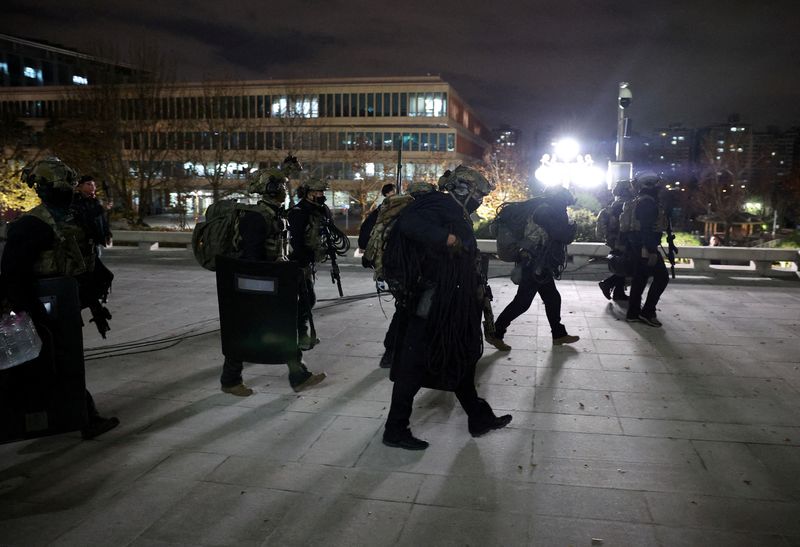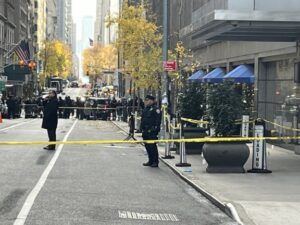South Korea’s President Yoon reverses martial law after lawmakers defy him

By Jack Kim and Ju-min Park
SEOUL (Reuters) -South Korean President Yoon Suk Yeol said on Wednesday he would lift a surprise martial law declaration he had imposed just hours before, backing down in a standoff with parliament which roundly rejected his attempt to ban political activity and censor the media.
In South Korea’s biggest political crisis in decades, Yoon shocked the nation and declared martial law on Tuesday night to thwart “anti-state forces” among his domestic political opponents. But outraged lawmakers unanimously rejected the decree. Yonhap news agency said the cabinet had agreed early on Wednesday to scrap the martial law.
Protesters outside the National Assembly parliament shouted and clapped. “We won!” they chanted, and one demonstrator banged on a drum.
The main opposition Democratic Party called for Yoon, who has been in office since 2022, to resign or face impeachment.
“Even if martial law is lifted, he cannot avoid treason charges. It was clearly revealed to the entire nation that President Yoon could no longer run the country normally. He should step down,” senior DP member of parliament Park Chan-dae said in a statement.
“South Korea as a nation dodged a bullet, but President Yoon may have shot himself in the foot,” said Danny Russel, vice president of the Asia Society Policy Institute think tank in the United States.
The South Korean won currency came off a more than two-year low against the dollar after Yoon’s reversal, while exchange traded funds linked to South Korean stocks similarly cut losses.
Yoon’s surprise declaration of martial law, which he cast as aimed at his political foes, was voted down by 190 lawmakers in parliament. His own party urged him to lift the decree. Under South Korean law, the president must immediately lift martial law if parliament demands it by a majority vote.
The crisis in a country that has been a democracy since the 1980s, and is a U.S. ally and major Asian economy, caused international alarm.
U.S. RELIEVED
After Yoon’s announcement of martial law in a TV address, South Korea’s military had said activities by parliament and political parties would be banned, and that media and publishers would be under the control of the martial law command.
Helmeted troops briefly tried to enter the parliament building. Parliamentary aides were seen trying to push the soldiers back by spraying fire extinguishers.
The White House said it was pleased Yoon had backed down.
“We are relieved President Yoon has reversed course on his concerning declaration of martial law and respected the… National Assembly’s vote to end it,” a White House spokesperson said.
Earlier, U.S. Deputy Secretary of State Kurt Campbell said the United States was watching events in South Korea with “grave concern.” Some 28,500 U.S. troops are stationed in South Korea to guard against the nuclear-armed North.
Yoon did not cite any specific threat from the North, instead focusing on his domestic political opponents. It was the first time since 1980 that martial law has been declared in South Korea.
Russel, who was the top U.S. diplomat for East Asia under former President Barack Obama, said South Korea was now looking at the prospect of snap elections.
“Political uncertainty and domestic strife in South Korea is not our friend. Political uncertainty and domestic strife in South Korea is North Korea’s friend, however. You can be sure that North Korea is licking its chops,” he said.
Yoon, a career prosecutor, squeezed out a victory in the tightest presidential election in South Korean history in 2022. He rode a wave of discontent over economic policy, scandals and gender wars, aiming to reshape the political future of Asia’s fourth-largest economy.
But he has been unpopular, with his support ratings hovering at around 20% for months.
His People Power Party suffered a landslide defeat at a parliamentary election in April this year, ceding control of the unicameral assembly to opposition parties that captured nearly two-thirds of the seats.

There have been more than a dozen instances of martial law being declared since South Korea was established as a republic in 1948.
In 1980, a group of military officers led by Chun Doo-hwan forced then-President Choi Kyu-hah to proclaim martial law to crush calls by the opposition, labour and students for the restoration of democratic government.





